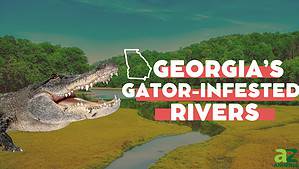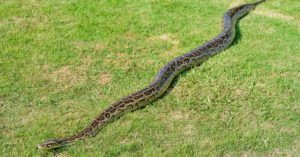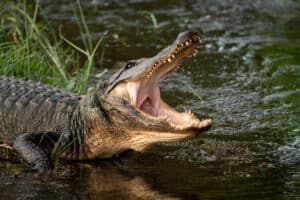If you are a resident of Georgia, you must have heard all about the alligators of Savannah. They are quite a common sight for the inhabitants of the region. You might even spot one of them roaming near the city lines at night. But is it safe to be around them? Can you swim around in the Savannah waters when you spot an alligator near you? In this blog post, you will find the answer to your questions and learn more about alligators. We will also clear the air on the difference between crocodiles and alligators, so you can better identify both animals.
Difference Between Crocodiles and Alligators
It is common to confuse crocodiles and alligators. This is because they belong to the same order, Crocodilia, and have similar bodies. However, there are key differences between these species that make them unique and easy to identify.
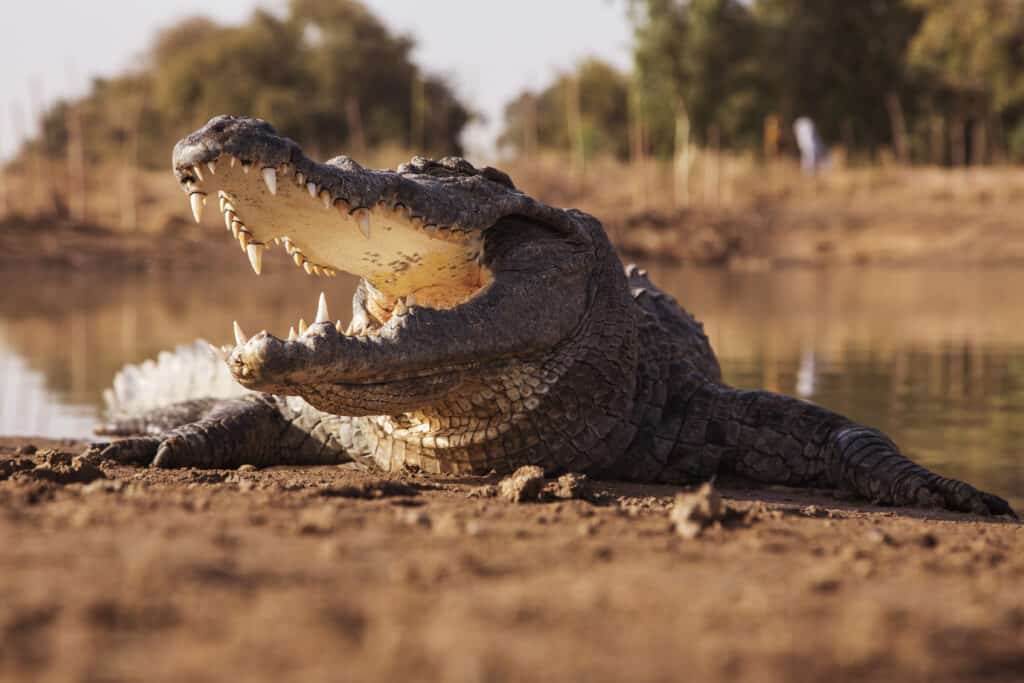
Crocodiles are lighter in color than alligators – with V-shaped snouts.
©StanislavBeloglazov/Shutterstock.com
1. Color
The first difference is the color of both animals. While crocodiles have a lighter color, alligators tend to have a darker shade. Crocodiles are often light green, olive green, or brown. As for alligators, they are blackish-gray or dark gray with a lighter underbelly.
2. Snout Shape
The next is their snouts, which is the most obvious indicator besides color. Most specialists can differentiate between both through this feature alone. An alligator has more of a U-shaped snout, which is round and wide. In contrast, crocodiles have a V-shaped snout that is pointed and sharp at the end.
3. Habitat
Another way to differentiate them both with ease is their habitat. Alligators prefer to stay in the freshwater, while crocodiles are more of a saltwater species. However, they may also be found in brackish waters, a mixture of salt and freshwater.
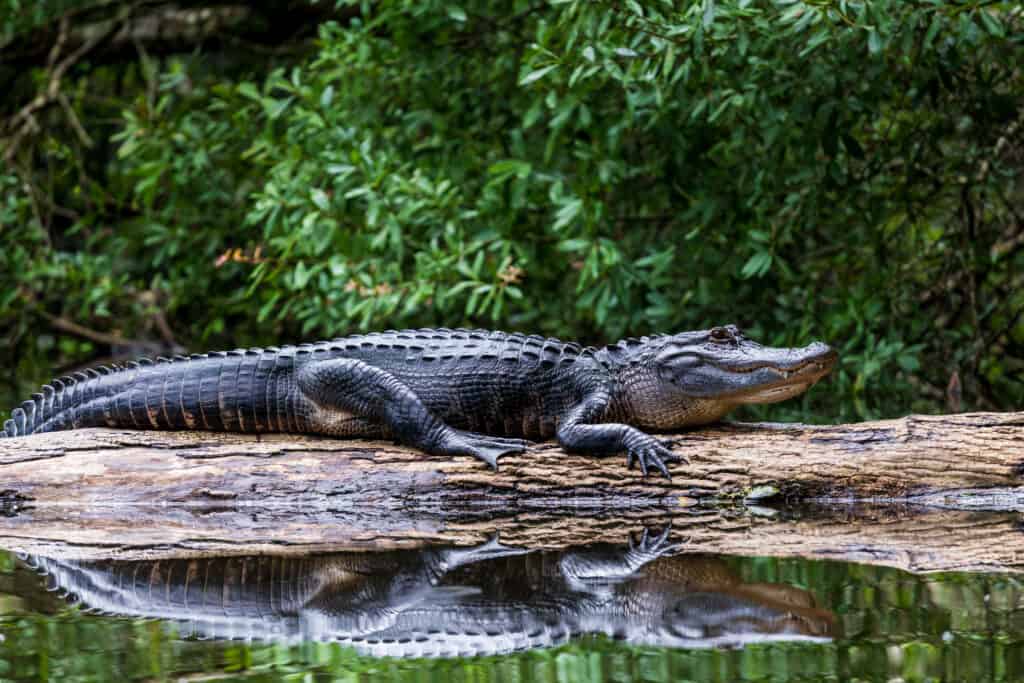
Alligators are a common sight for the inhabitants of Savannah, Georgia.
©iStock.com/Joe Pearl Photography
How to Identify an Alligator in Georgia?
An alligator may weigh up to 800 pounds and grow up to 15 feet long. However, the sizes and weights do vary. Some weigh more than 800 pounds, while many are smaller than 15 feet. Their size usually ranges between 8 to 15 feet in length, including their tails. The females are shorter in length than the male alligators.
The diet of an alligator is quite interesting. They will feed upon anything easily available, which is why they are also termed opportunistic feeders. The adults usually prey on birds, fishes, smaller mammals, turtles, and even snakes. However, the younger ones tend to stick to insects, amphibians, and smaller fish.
Alligators produce eggs which may be up to 38 in number. Out of this huge number, roughly 5 to 6 mature into juvenile adults. This is because flooding, predators, and cannibalism take out the other eggs and young.
Another special characteristic of alligators is that they are ectothermic. Because of their reptilian nature, they rely heavily on external temperature for thermoregulation. When the temperature drops, they tend to hibernate and are found in hiding.
They have excellent night vision, which is why you might often find them lurking for prey, even in low lights. This feature is because of a special structure beneath the photoreceptors in their eyes, allowing for a larger deflection of light. This feature is found in almost all nocturnal animals.
Alligators are advanced reptiles. They have a four-chambered heart, unlike the three-chambered heart found in most reptilians, closely resembling that of a human heart.
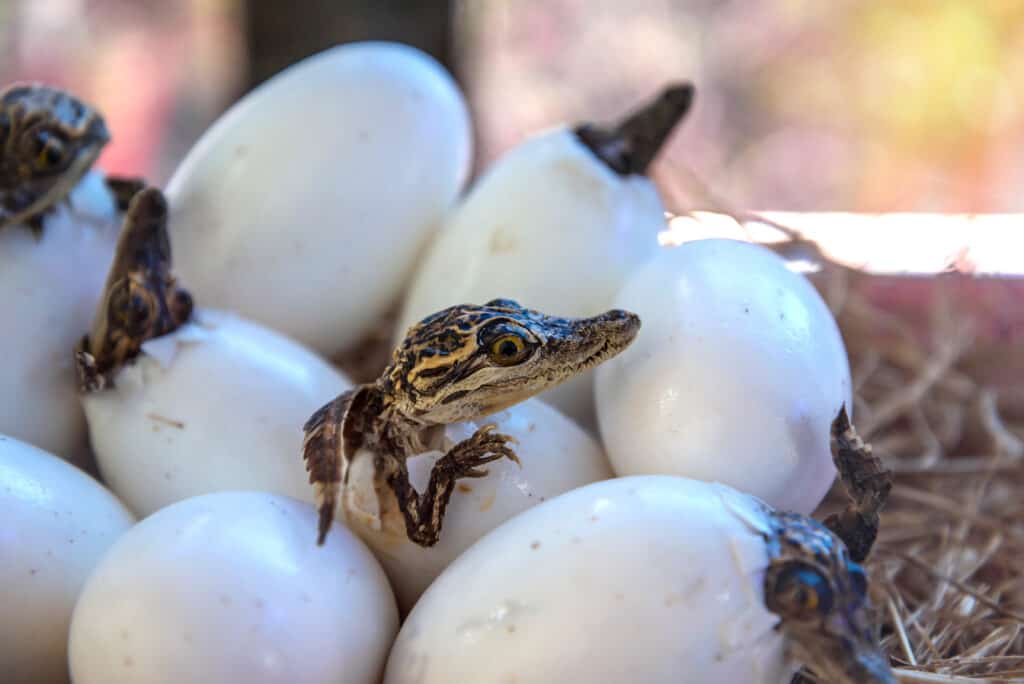
Alligators produce eggs which may be up to 38 in number. Out of this huge number, roughly 5 to 6 mature into juvenile adults.
©iStock.com/Casanowe
Alligator Species in Savannah
There are only two species of Alligators in the world; one lives in America, while the other is found in China. Thus, when we talk about the alligator species that are native to Savannah, there is only one that comes to light, the American alligator. They are also called “Florida alligators,” “Mississippi alligators,” and “Louisiana alligators.”
Where Do the Alligators in Savannah Live?
There are around 200,000 American alligators in Georgia alone. In Savannah, there are two main habitats for the alligators, the Savannah Wild Refuge and the Savannah River.
The Savannah Wild Refuge is seven miles away north of downtown, while the Savannah River runs through the city. If you are in the mood for an alligator sighting, you can spot one easily at both of these places. The Wild Refuge even has hiking trails that allow people to go sightseeing safely for the big lizard. There are probably over hundred alligators alone at the Refuge.
If you are familiar with the city, you will know that there are many alligator spots around apart from these two popular places. The thing about Savannah is that it has many swamps. Moreover, the city is covered with places where there are still bodies of water. Such sites make the perfect habitat for alligators which is why you will find many of these animals crawling around the city swamps.
Is It Safe to Swim in the Savannah Waters?
Now, you are probably wondering if half of Savannah’s water is filled with alligators, where would you swim? Is it even safe to swim in waters where a big lizard is stalking you with its shiny eyes?
The answer is yes; it is safe to swim in Savannah waters if you know where to go. Savannah River is filled with alligators, but it is also not the best place to take a swim. You will not only be crowded by the alligators, but you will also find it quite dirty for your liking. It is a swamp with obstacles, plants, and evident pollution flowing inside it.
So, even if you do decide to take a swim with the alligators, it would not be ideal. As for swimming with the big lizards, it is secure to do so if you follow the safety precautions. You can also opt to go to the beach that is near Savannah. Many people take their days off to visit Tybee Island. If you are not a fan of potentially risking your life, this beach can be your go-to spot for swimming.
Tybee Island is free of alligators. However, there were a few cases reported where a couple of alligators decided to invade the beach. Nonetheless, a lot of people go there, and various safety nets are present to give you a safe swimming experience.
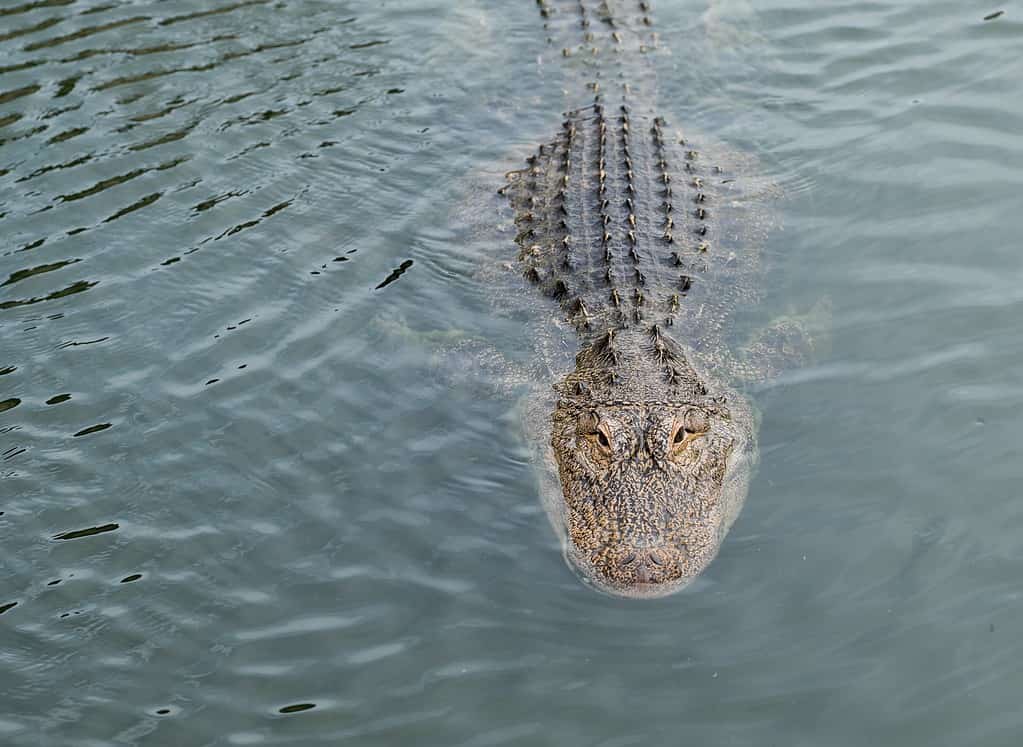
Savannah being an alligator region, there are many secured spots for sightseeing and swimming.
©David Louis Tiffany/Shutterstock.com
Safety Tips for When You Are Around Alligators in Savannah
Alligators are not as aggressive as crocodiles. They are not dangerous by nature. They might not even attack a human unless provoked. Some cases have been reported where the alligators attacked civilians, but it is not the rule. Alligators often go out at night to look for food sources if they are not satisfied with their habitat. This is why you might hear the news about alligators roaming near the city lines. It is recommended not to go near them when they are looking for food.
Similarly, if you do decide to go to Savannah waters and take a swim with the alligators, you must follow a few safety tips. It will help you steer clear of the alligators’ aggressiveness and have a decent swimming experience with the reptile. Plus, it can be something that you never thought you would tick off your bucket list. Nonetheless, we suggest taking it seriously and following the precautions to the dot.
1. Don’t Feed the Alligators
The most basic safety tip is not to feed the alligators. The signs are there for a reason. When you try feeding an alligator, they start developing a learning behavior of associating humans with food. Plus, they might pounce on you when they see the food dangling in front of them. They might even attack people when they spot the same food in others’ hands in the future.
2. Don’t Try to Move Them
When it is their breeding season, you will find them traveling from one site to another. This happens during the summer and springs season. When you see them moving, do not disturb them. Maintain your distance and let them pass. It would not be wise to try and move them away from your path. Moreover, it is also not recommended to try and corner them. This would trigger them into thinking you are attacking them.
3. Stay On Dry Land
If you wish to go to ponds that are within the vicinity of alligators, it is best to stay on the beach. However, if it is saltwater, the chances are very less likely that you will spot one in the water.
4. Avoid Them at Night
Whether you are going for a swim or a stroll, avoid the alligators at night. This is the time when they are out for food and actively hunting. So, it is best to maintain a distance even if you encounter one.
5. Maintain Your Distance
Try to keep a distance of at least 60 feet between yourself and the alligator. If you hear them growling, you are too close to them.
6. Swim in the Secure Spots
Savannah being an alligator region, there are many secured spots for sightseeing and swimming. You will find designated areas that are alligator-free and safe for swimming. Moreover, there are almost always guides and lifeguards present in these regions in case of an emergency.
7. Avoid Heavily Habitated Alligator Areas for Swimming
Try to avoid areas that are filled with alligators. Even if they are not aggressive, they may attack you if they feel threatened. This may happen when you are swimming, causing the water to splash, which might come off as a sign of danger to the alligators.
8. Do Not Go Near the Nesting Areas
The nesting areas are never a good site to visit. The female species always has an eye on the nesting area, even if it is nowhere to be found near the site. Try to avoid going there, as the female alligators might think her babies are being attacked. Plus, do not go near the young or the eggs. The young might not harm you, but its parent might consider you a potential harm to its babies.
The photo featured at the top of this post is © Danita Delimont/Shutterstock.com
Thank you for reading! Have some feedback for us? Contact the AZ Animals editorial team.




